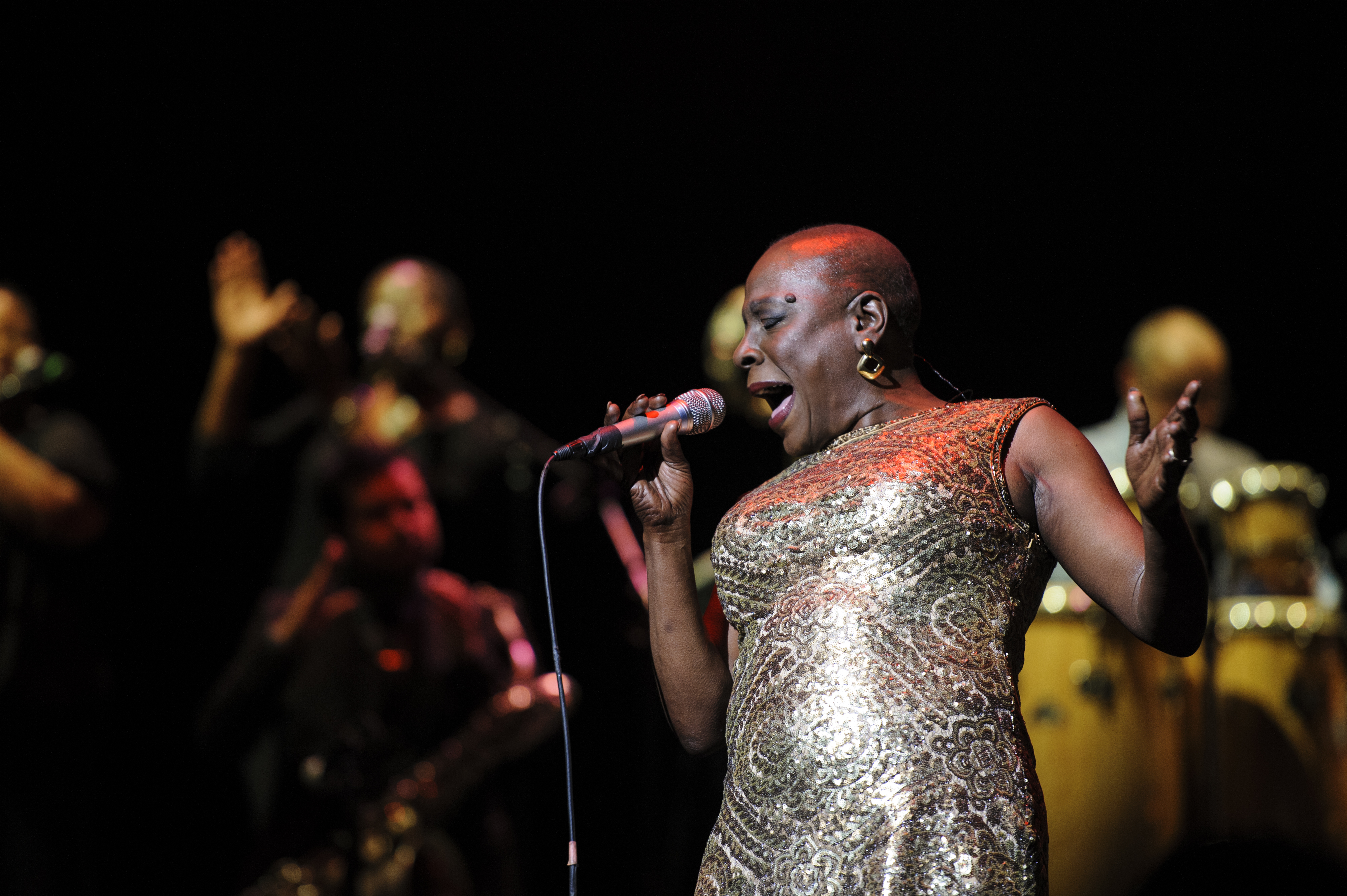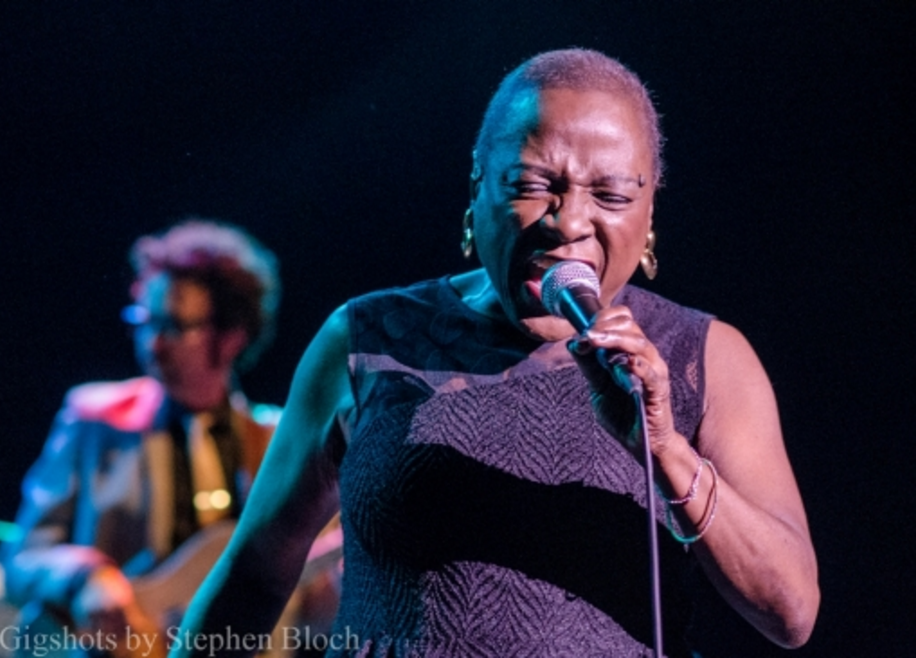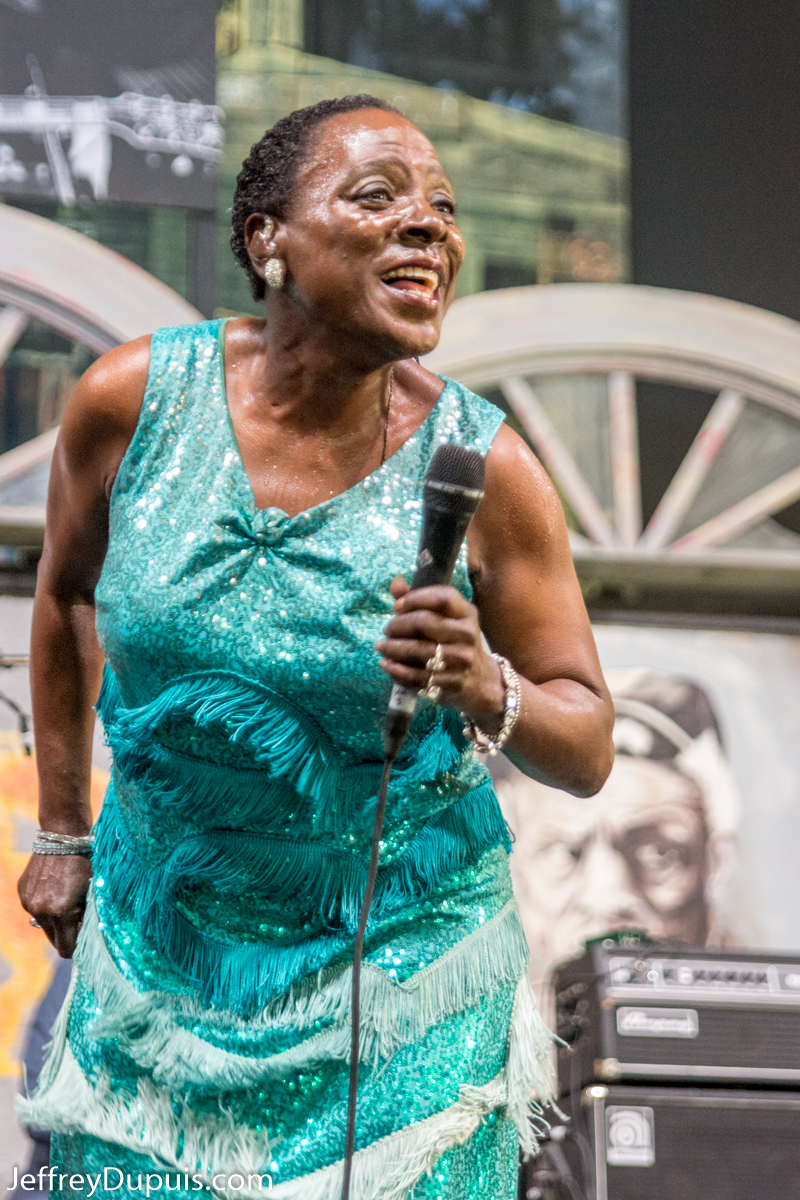Sharon Jones: Give the People What They Want

Sharon Jones’ life story had all the makings of a classic music documentary long before she was diagnosed with Stage 2 pancreatic cancer. Born in North Augusta, S.C.—on the edge of the Georgia town that produced “The Godfather of Soul” himself— Jones was famously told that she was “too fat, too black, too short and too old” for stardom before her career kicked into gear at age 40, after a serendipitous meeting with future Daptone founder Gabriel Roth. And, along with Roth and her mighty Dap-Kings, Jones has spent the past 20 years not only shattering each and every one of those glass ceilings, but also ushering in a soul revival whose cultural impact is only outweighed by its funkiness. Yet Jones didn’t feel the need to bring her story to the silver screen until 2013, when she feared her unprecedented second act might be cut short.
“Once I knew that the cancer was there, I told my management that I wanted to let my fans know what was going on in order to have a connection with them,” the now 60-year-old Jones says during an intense promotional blitz for the new Barbara Kopple-produced documentary focusing on her courageous battle, Miss Sharon Jones! “That was my therapy.”
It’s been a tough few months for the singer, who announced that her cancer had returned during a Miss Sharon Jones! screening at the Toronto International Film Festival in September of 2015. What could have been a well-deserved victory lap has turned into a vivid reminder of her recent struggles and a powerful rallying call, as Jones makes the rounds supporting the candid film while combating the disease. In recent months, her cancer has advanced to Stage 4 and spread to her lung, liver and lymph nodes.
“Being able to see this movie is getting me through this again—the other day, I was like, ‘I can’t do this,’” Jones admits without ever losing that classic front-woman fight in her voice. “I have to allow myself to have a pity party; I have to allow myself to cry. I have to allow myself to feel bad. But when the medication starts to affect me vocally, or affect my energy— when I get onstage and feel that I can’t dance—seeing the movie helps me go, ‘OK, Sharon, get on up. Get back out there. You’re not in pain if you got that energy—get onstage and do the best you can.’ That’s where I’m at now. It’s giving me that extra boost.”
Despite relying on a cocktail of medicine every day, Jones has continued to tour with the Dap-Kings—and fills in the rare holes in her schedule with interviews, screenings and appearances tied to Miss Sharon Jones!’s release that would certainly wear out musicians half her age with a clean bill of health. After wrapping up a few more press obligations on this hot July day, she will head to Holmdel, N.J., for a stop on the Dap-Kings’ uber-funky summer shed run with Hall & Oates and Trombone Shorty & Orleans Avenue. The group’s middle slot between the two bands feels like a nice encapsulation of their place in the music industry. She’s also continued to record, releasing three albums in the past two years: her sixth full-length, Give the People What They Want, the pan-denominational Christmas album It’s a Holiday Soul Party and a soundtrack for her film.
“It’s a struggle. The chemo has a certain effect—like neurology in my feet when I’m standing,” she admits. “It came back in three different spots. They had me on the patch. I’m getting ready to cut back on a lot of the pain medication I’ve been taking. That’s the difference. I’m doing these shows, feeling a little loopy and really lethargic. I talked to the doctor and tonight we’re going to cut the medication from 50 to 25.”
Jones received her initial cancer diagnosis in the spring of 2013 and, soon after, her longtime manager Alex Kadvan reached out to Barbara Kopple about capturing her story. Kopple, 70, is a singular voices in modern documentary filmmaking. She’s a two-time Academy Award-winning director whose most decorated films, Harlan County, USA and American Dream, concern a Kentucky miners’ strike and the Hormel Foods strike, respectively. She also explored celebrity culture with the lauded Woody Allen doc Wild Man Blues.
Kopple had heard of Jones before Kadvan reached out through VH1 connections, though she admits that she didn’t know much of her work beyond radio tracks like “100 Days, 100 Nights.” “The first time I met Sharon, we were filming one of the most transformational and intimate moments of her life—when she’s having her head shaved, something that is so familiar to so many cancer patients,” Kopple admits. “It was just the most extraordinary time to meet somebody because we totally bonded during something that was so tough and di¡cult.”
Jones allowed Kopple almost complete access into her life from 2013 until the film wrapped last year. “Woody Allen holds things back and, when I did Wild Man Blues, he didn’t want me to show him shaking hands with people, then running to wash his hands because he had a phobia about germs,” she says. “The beauty of Sharon is that this is who she is in real life. She’s the real deal. She is a genuine article. She’s just this wonderful, poised, raw, raunchy, fantastic musician and singer. She’s an open book—the only thing she didn’t want me to film is her getting out of bed.”
As Kopple traced Jones’ recovery, she followed her to doctors appointments, talked with her extended Daptone family and even accompanied her to try on wigs. They attended the Grammys together and traveled to Augusta for a victorious homecoming show. Jones says that her journey has reinforced her faith, and one of the film’s most poignant moments finds her preparing for her 2014 return to the stage by testing out her voice in a church.
“I interviewed her backstage when she first came back at the Beacon Theatre in New York [on Feb. 6, 2014], and she hadn’t performed in seven or eight months—she just didn’t know who this Sharon was going to be,” Kopple says. “She wanted to dance and she wanted to sing and she wanted to shake her hair, which she didn’t have at that point, and she was really scared. She was holding a cup in her hand and her hand was shaking—then, suddenly, it was show time and she got next to the curtain. She looked like a prize fighter. I couldn’t stop thinking about how resilient and alive she was. Sharon really sees things through the power of her voice. I knew she was going to be a big part of my life.”
The film also doubles as a long overdue biography of Jones, who grew up the youngest of six children in Brooklyn’s rough Bedford-Stuyvesant neighborhood after her mother relocated the family to the North. She spent time as a corrections officer at Rikers Island and was working as an armored car guard for Wells Fargo when she met Roth in 1996 while singing background on a pre-Daptone Lee Fields session.
“I was like, ‘What does that curly-haired Jewish boy know about soul music?’” Jones says with a laugh of the initial meeting that would change the course of her career. “I just came from work, so I had on my Wells Fargo outfit. Every one of those [Daptone] musicians practices a ton in order to play this music, but you can’t just learn soul. It’s something that’s inside of you—and you either got it or you don’t.”
As Roth expanded his reach to include the now-defunct Desco label and his current Daptone family, Jones gradually found herself blossoming into the matriarch of a community of musicians who would go on to form such revered acts as Lee Fields & The Expressions, Antibalas, The Budos Band, Charles Bradley & His Extraordinaires and many others. Jones’ love for her multi-generational ensemble is palpable when she reminisces about meeting longtime Daptone drummer Homer Steinweiss when he was still a teenager.
Sharon Jones & the Dap-Kings, who released their first album in 2002 and crossed over into the mainstream a few years later, also emerged at the center of a funk and soul revival that echoed the hipster underground’s desire to combat the instant gratification of the social media age with a yearning for things that are small batch and authentic. Crowned “The Queen of Funk” decades after she was told her time was over, Jones has managed to connect the dots between David Byrne, Lou Reed, Michael Bublé, Booker T. Jones, Joe Jackson, Dan Zanes, Rufus Wainwright, Grace Potter, The Gaslight Anthem and Tedeschi Trucks Band, who toured with her group in 2015.
She’s even been courted by some of the very musicians who once shunned her because of her age and appearance. “Back in the day, they were just looking for boobs and thighs, a certain look,” she says with a chuckle. “They know it, and the ones that don’t, eh, I don’t need to put it in their face. I just thank God because I know that he gave me a gift so that one day [people] would choose me for my voice, not the way I look.”
Her success with the Dap-Kings wasn’t immediate, though. Jones says that, for years, she had to travel to Europe to play her distinctive brand of American soul music. Closer to home, she credits the open eared jamband festival circuit and a few key indie-rock promoters for booking her fiery, high-energy show when few others would. In particular, she considers her appearance with Phish during their 2009 Halloween Festival 8 event as a turning point. “I didn’t know who they were,” she says of the appearance, during which the group covered The Rolling Stones’ Exile on Main Street. “I picked up so many fans being at that Phish concert. The same when we were with Tedeschi Trucks Band.” She hopes Miss Sharon Jones! will have a similar effect. 
When she hasn’t been touring this year, Jones has spent considerable time receiving cancer treatments in Upstate New York. She thinks of 2014’s Give the People What They Want—which was recorded and shelved while Jones recovered the first time, then released when she returned to the road—as the most direct manifestation of how her disease has shaped her music. She says the album’s key track, “Get Up and Get Out,” took on a different meaning.
“It just came to me one night while I was on the stage,” Jones says. “When I was in the hospital, I kept saying, ‘Cancer, you get up and get out.’ I’ve always had the shouting thing in my work—that’s part of my repertoire. I’ll let you know the lungs are the best part; I get to show people the energy I have and how much I love doing that by shouting. We changed the music to capture that resilience.”
She continues to own her style physically, too, performing without a wig even though she has lost her hair. That prize-fighter mentality remains; the fierce determination in her eyes matches her powerful R&B belt and small frame.
Longtime Daptone MC and guitarist Binky Griptite doesn’t shy away from mentioning her age or disease when introducing her onstage, either. Other reminders are slightly more veiled. Jones flashes back to her struggle every time she sees the video for the Give the People What They Want song “Stranger to My Happiness.” “All those months I was down and out, I didn’t listen to any music,” Jones says. “‘No one knows the pain I went through to get that video—in between each take, I had to sit down and cover up. I think about how that video went to my fans and they saw that I’m OK.”
Kopple sees that true connection to her fans as part of Jones’ true, higher calling. “There’s a scene [in Miss Sharon Jones!] when she goes into tears wishing that her mother could be there and how her mother supported her and said, ‘Listen, you’re this beautiful, young, gorgeous woman. You have been given this phenomenal gift—use it,’” she says. “She just wants people to know who she really is.”




















